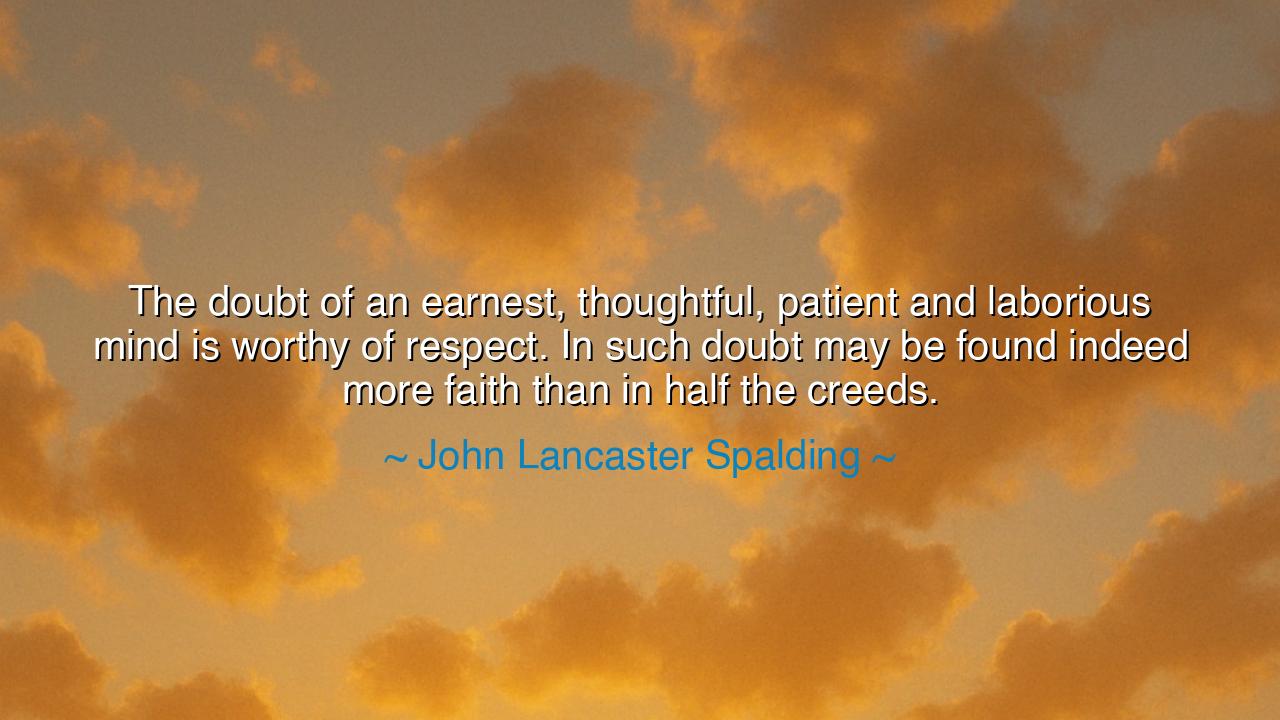
The doubt of an earnest, thoughtful, patient and laborious mind
The doubt of an earnest, thoughtful, patient and laborious mind is worthy of respect. In such doubt may be found indeed more faith than in half the creeds.






The words of John Lancaster Spalding—“The doubt of an earnest, thoughtful, patient and laborious mind is worthy of respect. In such doubt may be found indeed more faith than in half the creeds.”—resound with the thunder of wisdom tempered by humility. At first glance, he seems to exalt doubt, a thing many fear, as though it were a mark of weakness. But Spalding reveals that doubt, when born of sincerity, reflection, patience, and labor, is not weakness at all. It is strength. It is not the aimless wandering of a careless spirit, but the noble questioning of one who longs for truth more deeply than for comfort. Such doubt, he teaches, is not the enemy of faith, but the furnace through which faith is refined.
In the ancient world, Socrates embodied this spirit. He professed that he knew nothing, and in so confessing, he showed himself wiser than those who claimed to possess every truth. His doubt was not idle—it was thoughtful, patient, and laborious. Through his questions, he unveiled the hollowness of false wisdom and led others toward deeper understanding. Spalding’s words echo this timeless lesson: that an honest seeker’s uncertainty is often closer to truth than the rigid confidence of those who cling to empty dogma.
The emotional force of this teaching lies in its defiance of appearances. Many would point to doubt as weakness, as failure, as evidence of a wavering soul. But Spalding reminds us that true faith is not blind acceptance, but trust that survives the trial of questioning. A creed repeated without thought is like a song sung without understanding: the lips move, but the heart remains unmoved. Yet the doubt of a sincere heart wrestles, struggles, and yearns for truth—and in this struggle lies the seed of deeper conviction than any memorized formula could ever provide.
Consider the story of Saint Augustine. In his youth, he wandered far from the faith, entangled in philosophy, temptation, and doubt. Yet his doubts were not careless; they were earnest, thoughtful, and laborious. He questioned not because he despised truth, but because he longed for it with all his being. And it was through this long night of uncertainty that he came at last to a faith so deep and enduring that it shaped the course of Western thought. His example shines as a living testament to Spalding’s insight: that honest doubt may carry within it the very flame of faith.
There is also a warning here. Spalding does not praise every form of doubt—only that which springs from patience, sincerity, and labor. The doubt of the lazy, who question only to avoid effort, is not the same as the doubt of the earnest seeker. The former is a cloak for indifference; the latter, a crucible for truth. To respect doubt rightly is to discern its source: is it born of pride and sloth, or of humility and longing? Only the latter leads to wisdom.
The lesson for us is profound: do not fear doubt when it arises in the course of deep seeking. Instead, honor it as part of the path. Welcome it as a companion that purifies your faith, stripping away what is shallow and false. For just as iron is strengthened by fire, so the soul is strengthened by questions that force it to dig deeper, to search harder, to hold only to what endures. To embrace doubt honestly is to prepare the soil for unshakable conviction.
Practical action flows from this wisdom. When doubt comes, do not flee from it or bury it in fear. Sit with it patiently. Study diligently. Reflect deeply. Seek counsel from those wiser than yourself. Write your questions, live with them, and let them teach you humility. And when at last you find an answer—or even the peace of not needing one—you will know that your faith has not been inherited cheaply, but forged nobly.
Thus, Spalding’s words shine as a beacon to all seekers: true doubt, born of labor and sincerity, may hold more faith than untested creeds. To the next generation we must pass this truth: do not mistake questions for weakness, nor creeds for certainty. It is the honest wrestling of the soul that brings forth the strongest faith, and in this lies the nobility of the human spirit.






AAdministratorAdministrator
Welcome, honored guests. Please leave a comment, we will respond soon